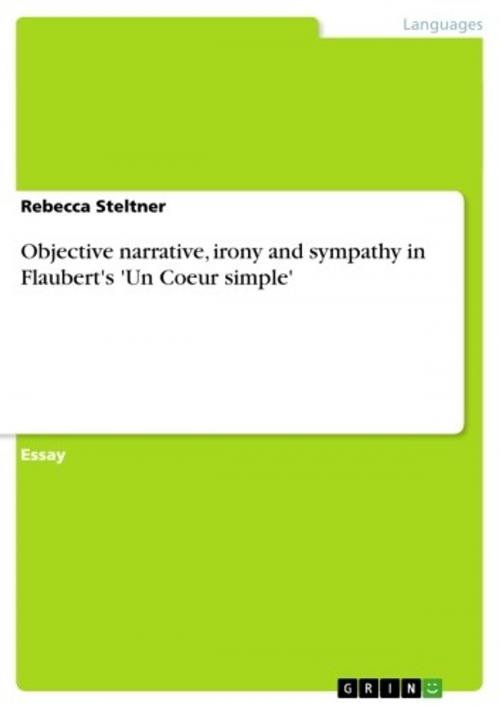Objective narrative, irony and sympathy in Flaubert's 'Un Coeur simple'
Fiction & Literature, Literary Theory & Criticism, French, European| Author: | Rebecca Steltner | ISBN: | 9783638185783 |
| Publisher: | GRIN Publishing | Publication: | April 19, 2003 |
| Imprint: | GRIN Publishing | Language: | English |
| Author: | Rebecca Steltner |
| ISBN: | 9783638185783 |
| Publisher: | GRIN Publishing |
| Publication: | April 19, 2003 |
| Imprint: | GRIN Publishing |
| Language: | English |
Essay from the year 2001 in the subject Romance Languages - French Literature, grade: 83 (entspricht 1+), University of Canterbury (School of European Culture and Languages), course: Seminar, 14 entries in the bibliography, language: English, abstract: Generally speaking, the statement is true: the reader does indeed feel sympathy towards Félicité and Flaubert's use of language certainly contributes to this. How is what needs to be examined. The judgement that 'Flaubert's tendency towards 'objective' narrative paradoxically increases the sympathy that the reader feels for Félicité' also poses many other questions such as what is meant by 'objective' narrative? How is it used in Un Coeur simple? What are the author's reasons for using such a narrative? And is so- called 'objective' narrative really objective or at all possible? By the way the view is worded, it seems that 'objective' narrative and the reader's sympathy for a fictional character are incompatible and that the increase in sympathy is thus paradoxical. At the moment this may indeed sound impossible but after having had a look at the other factors that come into this equation, which are e.g. the choice of subject matter, the use of style indirect libre and the role of irony - the reader's increased sympathy should come across as a logical result. I am aware that it is of course controversial to engage in academic argument over such impressions as 'irony' or 'tone', because such notions are highly subjective and a therefore a certain source of disagreement. Nevertheless, ironology does come up with some interesting approaches to Flaubert's style and especially his use of style indirect libre and the question whether it actually increases sympathy. I also believe that irony is employed as an important vehicle for sympathy in this story.
Essay from the year 2001 in the subject Romance Languages - French Literature, grade: 83 (entspricht 1+), University of Canterbury (School of European Culture and Languages), course: Seminar, 14 entries in the bibliography, language: English, abstract: Generally speaking, the statement is true: the reader does indeed feel sympathy towards Félicité and Flaubert's use of language certainly contributes to this. How is what needs to be examined. The judgement that 'Flaubert's tendency towards 'objective' narrative paradoxically increases the sympathy that the reader feels for Félicité' also poses many other questions such as what is meant by 'objective' narrative? How is it used in Un Coeur simple? What are the author's reasons for using such a narrative? And is so- called 'objective' narrative really objective or at all possible? By the way the view is worded, it seems that 'objective' narrative and the reader's sympathy for a fictional character are incompatible and that the increase in sympathy is thus paradoxical. At the moment this may indeed sound impossible but after having had a look at the other factors that come into this equation, which are e.g. the choice of subject matter, the use of style indirect libre and the role of irony - the reader's increased sympathy should come across as a logical result. I am aware that it is of course controversial to engage in academic argument over such impressions as 'irony' or 'tone', because such notions are highly subjective and a therefore a certain source of disagreement. Nevertheless, ironology does come up with some interesting approaches to Flaubert's style and especially his use of style indirect libre and the question whether it actually increases sympathy. I also believe that irony is employed as an important vehicle for sympathy in this story.















